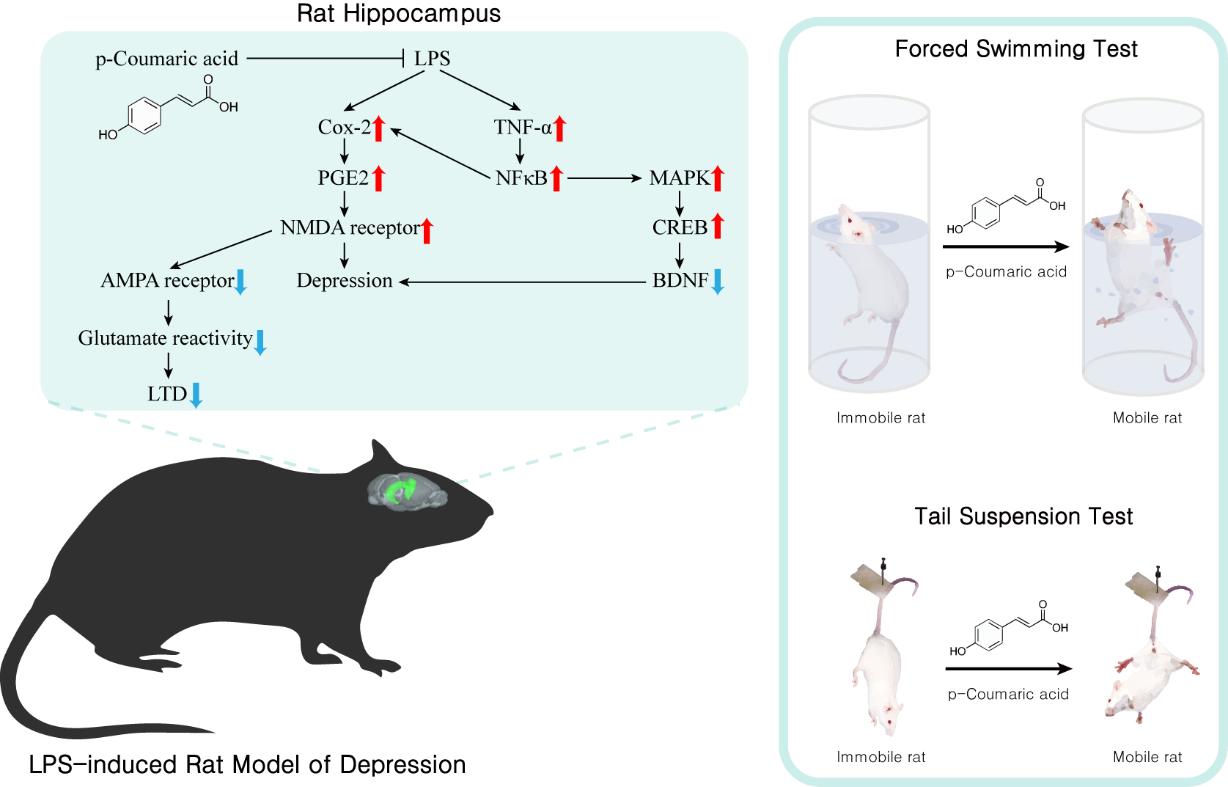Articles
Article Tools
Stats or Metrics
Article
Original Article
Exp Neurobiol 2018; 27(3): 189-199
Published online June 30, 2018
https://doi.org/10.5607/en.2018.27.3.189
© The Korean Society for Brain and Neural Sciences
Antidepressant-like Effects of p-Coumaric Acid on LPS-induced Depressive and Inflammatory Changes in Rats
Seok Lee1†, Hyun-Bum Kim1†, Eun-Sang Hwang2, Eun-seok Kim3, Sung-Soo Kim3, Tae-Dong Jeon3, Min-cheol Song1, Ji-Seung Lee1, Min-Chan Chung3, Sungho Maeng2* and Ji-Ho Park1,4*
1Department of East-West Medical Science, Graduate School of East-West Medical Science, Kyung Hee University, Yongin 17104, 2Department of Gerontology, Graduate School of East-West Medical Science, Kyung Hee University, Yongin 17104, 3Department of East-West Medicine, Graduate School of East-West Medical Science, Kyung Hee University, Yongin 17104, 4Research Institute of Medical Nutrition, Kyung Hee University, Yongin 17104, Korea
Correspondence to: *To whom correspondence should be addressed.
Sungho Maeng, TEL: 82-31-201-2916, FAX: 82-31-204-8119
e-mail: jethrot@khu.ac.kr
Ji-Ho Park, TEL: 82-31-201-2180, FAX: 82-31-204-8119
e-mail: jihopark@khu.ac.kr
†These authors contributed equally
Abstract
Depression causes mental and physical changes which affect quality of life. It is estimated to become the second most prevalent disease, but despite its commonness, the pathophysiology of depression remains unclear and medicine is not sufficiently protective. p-Coumaric acid (p-CA) is a dietary phenolic acid which has been proven to have antifungal, anti-HIV, anti-melanogenic, antioxidant and anti-inflammatory effects. Considering these effects, we investigated whether p-CA can prevent depressive symptoms by reducing inflammatory cytokines in animals injected with lipopolysaccharide (LPS). Changes in despair-related behaviors, inflammatory cytokines, neurotrophic factors and synaptic activity were measured. In these animals, p-CA improved despair-related behavioral symptoms induced by LPS in the forced swim test (FST), tail suspension test (TST) and sucrose splash test (SST). p-CA also prevented the increase of inflammatory cytokines in the hippocampus such as cycloxigenase-2 and tumor necrosis factor-α due to LPS. Similarly, it prevented the reduction of brain-derived neurotrophic factor (BDNF) by LPS. Electrophysiologically, p-CA blocked the reduction of long-term depression in LPS-treated organotypic tissue slices. In conclusion, p-CA prevented LPS-induced depressive symptoms in animals, as determined by behavioral, biochemical and electrophysiological measures. These findings suggest the potential use of p-CA as a preventive and therapeutic medicine for depression.
Graphical Abstract

Keywords: Depression, p-coumaric acid (p-CA), Lipopolysaccharide (LPS), Long-term synaptic depression (LTD), Cytokines


